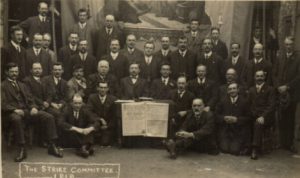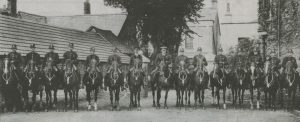
Newton Abbot Strike Committee during the 1919 railway strike
The late 19th and early 20th century was a key period for trade unions. The tight laws to restrict their actions and the need for wider social justice led unions to seek greater political influence and the Labour Party was born. Ahead of the First World War was a time of unrest across the country. In the South West there were major battles such as the china clay strike in Cornwall, the railway strike and others. The war led to a shocking slaughter and its impact was keenly felt in every city, town and village across the West Country. The need to turn the economy onto a war-footing gave shop stewards a critical role and brough women into the labour force and unions.
Women were prepared to fight employers for justice such as the so-called ‘Wildcat Women’ of Bridport. After the war the economy suffered and industries such as coal had to adapt to a new world order of trade. The miners of Somerset and the Forest of Dean suffered as they founght against pay cuts. In defence of the miners the TUC called the 1926 General Strike. Its defeat was a disaster for trade unionism and working people but it demonstrated a remarkable solidarity by workers across the South West.

Mounted police in Lydney during the 1926 General Strike
As the depression bit, the fight for jobs became the main issue of the day, a campaign that was needed again during the Thatcher years.